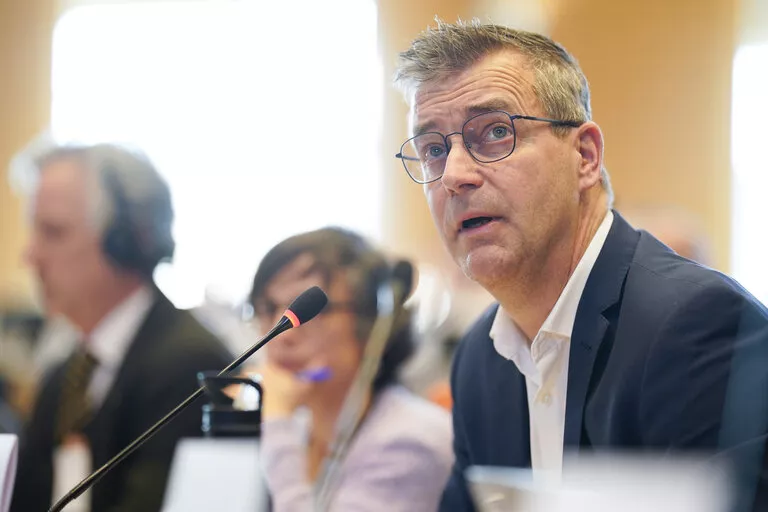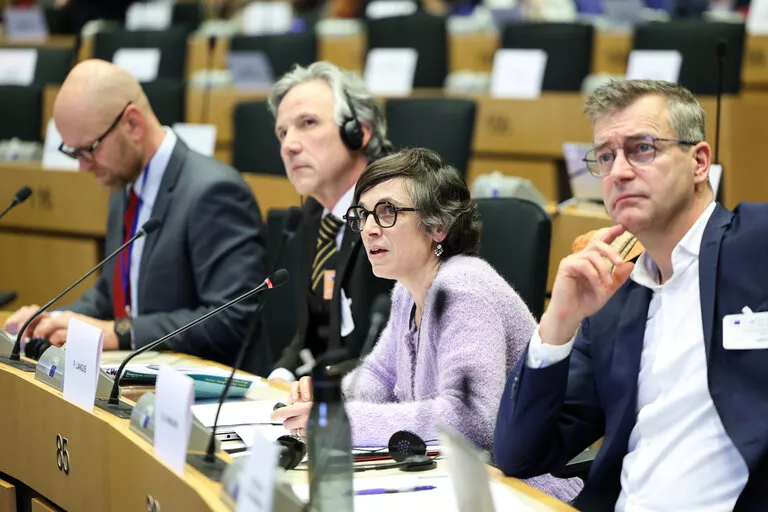On 13 January 2025, the Environment and Agriculture Committees of the European Parliament held a joint public Hearing to discuss the European Commission's proposal on forest monitoring, titled “Forest Monitoring for resilient European Forests”.
The Hearing featured insights and presentations from four expert speakers, and was divided into two panels. The first panel, focusing on “Robust indicators for multifunctional ecosystems - how to best assess trends and threats in forests” included Pr. Gert Jan Nabuurs, Wageningen University, and Dr. Jaroslav Kubišta, Director General of the Czech Forest Management Institute. The second panel focused on “Harmonised forest monitoring - how to obtain the best data for sustainable forest management” and it featured Ms. Fanny-Pomme Langue, CEPF Secretary General, and Dr. Peter Pröbstle, Head of the Bavarian Regional office for Forest and Forestry (LWF), as expert speakers.
The panellists presented their views on the initiative and discussed current state and future strategies for monitoring Europe’s forests in the relation to the European Commission’s proposal.
Prof. Gert-Jan Nabuurs presented his views on the proposal for a Forest Monitoring regulation. He highlighted the importance of a forest monitoring and more timely information to improve Europe's ability to track rapid forest changes, noting that existing efforts are not progressing fast enough to meet current needs. He compared and presented the pros and cons of ground-based and remote sensing underlining the necessity of both ways of collecting data and information about forests. While emphasizing the importance of moving forward, he noted that the law as proposed asks a lot and that not all countries are currently equipped to meet its requirements. He suggested starting with a smaller scope, with an implementation process of 5-10 years and building on existing expertise from national forest inventories (NFIs). He also highlighted the importance of data confidentiality, iterative collaboration between the Commission and Member States, and defining clear governance and use of data.


Dr. Jaroslav Kubišta presented and compared the Czech NFI results, and the ones obtained when using solely remote sensing. Dr. Kubišta called for a realistic approach at the EU level, noting that some information needs may be too costly to monitor and to report. He highlighted the irreplaceable value of local knowledge and the necessity of NFIs, which are already available in most Member States. He concluded that combination of NFI with the remote sensing is necessary, but it has to be done in a proper, statistically sound way, underlining the importance of ensuring data security.
Ms. Fanny-Pomme Langue expressed European forest owners’ concerns regarding the proposal, addressing three key questions:
Who needs European forest monitoring? She explained that forest owners do not, as they already have local systems that provide the high-resolution data necessary for effective forest management. Forest owners require high-quality, locally designed data for their daily operations, and the good news is that they already have many tools at their disposal to do so. The EU initiative, as proposed, cannot meet these needs. However, she noted that good data could benefit EU policy-making if it is collected and aggregated by Member States and if each indicator’s purpose is clearly defined.

What is the actual purpose of the proposal? Ms. Langue expressed forest owners’ concerns over the unclear purpose of the proposal. While its title suggests an aim to improve forest resilience, she pointed out that collecting data will not make forest more resilient per se and that the focus on data collection lacks transparency on how the data will be used. She suggested that a possible purpose could be to foster cooperation among Member States on data harmonization and to support them in implementing existing EU legislation.
Does the proposal sufficiently build on existing efforts? Ms. Langue underlined that forest owners believe it does not, as it introduces new indicators that differ from those in other EU legislations, potentially causing confusion and inefficiencies. She also noted that it diverges from the indicators used in National Forest Inventories and overlooks the outcomes of EU projects focused on forest monitoring. Ms. Langue stressed that forest owners rely on co-legislators to improve the initiative, ensuring that we avoid building a treehouse before growing a tree.


Dr. Peter Pröbstle presented his views on the regulation, highlighting the very long existence of European and national forest monitoring initiatives, partly well-coordinated. He emphasized the long-term nature of forest monitoring and recommended building on existing systems and carefully merging and harmonizing them. He noted that forest monitoring must be versatile, adapted to local conditions, and focused on clear objectives. He suggested defining monitoring goals, assessing existing surveys, and selecting the right indicators and methods. For concrete proposals, Dr. Pröbstle suggested integrating existing ICP Forests Monitoring, recording indicators on a subsidiary basis by the EU countries and harmonising them through joint work with the Commission. He concluded that data protection must be guaranteed.
The four presentations had common ground when it came to the inclusion of national forest inventories, the need for a reduced scope for a European forest monitoring taking into account needs and technical feasibility, the importance of data security and confidentiality, and the fact that precise and accurate data for forest management cannot be obtained through a European monitoring.
Following each panel’s presentations, a Q&A session allowed experts to provide additional insights and respond to questions from various MEPs. In conclusion, all four speakers called for clarification and simplification of the initiative.
You can find experts' presentations below and watch the full recording here: https://multimedia.europarl.europa.eu/en/webstreaming/agri-envi-committee-meeting_20250113-1500-COMMITTEE-AGRI-ENVI




